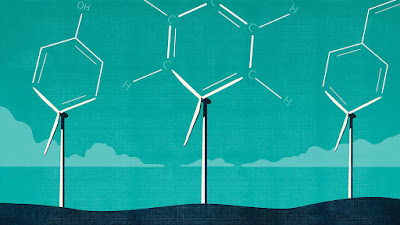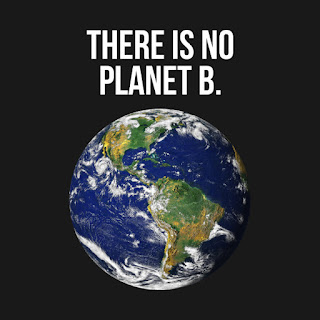 |
| BENEDETTO CRISTOFANI/SALZMANART |
Topics: Chemistry, Climate Change, Economy, Global Warming, Green Tech, Jobs
This week will be historic. In over 150 countries, people are stepping up to support young climate strikers and demand an end to the age of fossil fuels. The climate crisis won’t wait, so neither will we. Source: Global Climate Strike dot net
As with the Parkland demonstrations on mass shootings, young people are leading us - actually, PULLING us over the line to DO something about both important matters.
This is not about being "woke": it's about being aware. The extreme avarice causing this societal division and economic stratification could be just the petard humanity hoists itself with* to extinction. I'm glad you all know that, because old, fossilized wealthy (men mostly) can't see beyond the next quarter; that their wealth also falls to dust if the planet fails beneath them. As far as the youth, this is THEIR planet as those above septuagenarians and octogenarians are exiting it. The very least adults can do is use our ashes to fertilize trees for more oxygen (my personal plans). We should leave something for them to live out their lives and dreams. To do less is the height of arrogance, self-destruction and egomania.
Shakespeare's phrase, *"hoist with his own petard", is an idiom that means "to be harmed by one's own plan to harm someone else" or "to fall into one's own trap", implying that one could be lifted (blown) upward by one's own bomb, or in other words, be foiled by one's own plan. Source: Wikipedia
*****
Black, gooey, greasy oil is the starting material for more than just transportation fuel. It's also the source of dozens of petrochemicals that companies transform into versatile and valued materials for modern life: gleaming paints, tough and moldable plastics, pesticides, and detergents. Industrial processes produce something like beauty out of the ooze. By breaking the hydrocarbons in oil and natural gas into simpler compounds and then assembling those building blocks, scientists long ago learned to construct molecules of exquisite complexity.
Fossil fuels aren't just the feedstock for those reactions; they also provide the heat and pressure that drive them. As a result, industrial chemistry's use of petroleum accounts for 14% of all greenhouse gas emissions. Now, growing numbers of scientists and, more important, companies think the same final compounds could be made by harnessing renewable energy instead of digging up and rearranging hydrocarbons and spewing waste carbon dioxide (CO2) into the air. First, renewable electricity would split abundant molecules such as CO2, water, oxygen (O2), and nitrogen into reactive fragments. Then, more renewable electricity would help stitch those chemical pieces together to create the products that modern society relies on and is unlikely to give up.
Chemists in academia, at startups, and even at industrial giants are testing processes—even prototype plants—that use solar and wind energy, plus air and water, as feedstocks. "We're turning electrons into chemicals," says Nicholas Flanders, CEO of one contender, a startup called Opus 12. The company, located in a low-slung office park in Berkeley, has designed a washing machine–size device that uses electricity to convert water and CO2 from the air into fuels and other molecules, with no need for oil. At the other end of the commercial scale is Siemens, the manufacturing conglomerate based in Munich, Germany. That company is selling large-scale electrolyzers that use electricity to split water into O2 and hydrogen (H2), which can serve as a fuel or chemical feedstock. Even petroleum companies such as Shell and Chevron are looking for ways to turn renewable power into fuels.
Changing the lifeblood of industrial chemistry from fossil fuels to renewable electricity "will not happen in 1 to 2 years," says Maximilian Fleischer, chief expert in energy technology at Siemens. Renewable energy is still too scarce and intermittent for now. However, he adds, "It's a general trend that is accepted by everybody" in the chemical industry.
I repeat:
 |
| Tee Public: I'm going to buy this shirt |
Can the world make the chemicals it needs without oil?
Robert F. Service, Science Magazine
Comments